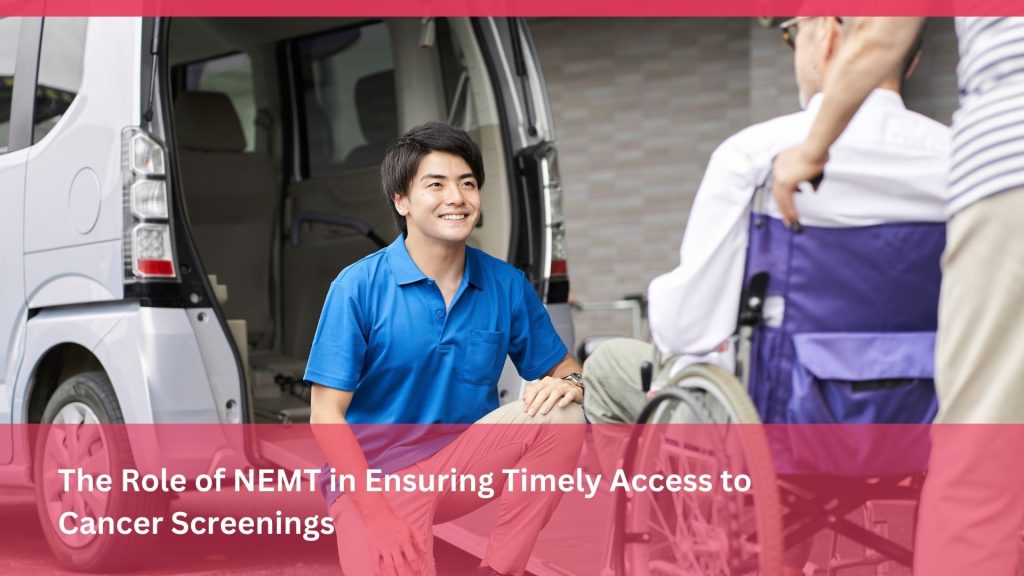New at Safr Care
The Role of NEMT in Ensuring Timely Access to Cancer Screenings

The Role of NEMT in Ensuring Timely Access to Cancer Screenings
Early detection through regular cancer screenings is a critical component in the fight against cancer. However, accessing these life-saving services can be a challenge for many, particularly those who live in remote areas, lack reliable transportation, or have mobility issues. Non-Emergency Medical Transportation (NEMT) services play a pivotal role in bridging this gap, ensuring that individuals have timely access to necessary screenings. This article explores how NEMT facilitates early detection of cancer by providing dependable transportation to screening appointments, thus potentially increasing survival rates and improving health outcomes.
1. Overcoming Transportation Barriers
Many patients miss or delay screenings due to transportation issues, which can be critical when dealing with a disease where early detection can significantly impact prognosis. NEMT addresses this by:
- Providing Reliable Rides: NEMT services ensure patients can get to and from their appointments without the stress of driving, parking, or navigating public transport.
- Accommodating Special Needs: For patients who require assistance due to age, disability, or other health issues, NEMT vehicles are equipped to handle various medical needs, including wheelchair access and support for those with limited mobility.
- Serving Rural and Underserved Areas: NEMT extends its services to rural regions where medical facilities may be scarce and public transportation is often non-existent.
By removing these barriers, NEMT helps ensure that no one is denied access to crucial cancer screening tests due to lack of transportation.
2. Enhancing Patient Compliance with Screening Guidelines
Regular screenings are vital for early detection of cancer, and missing scheduled appointments can delay diagnosis and treatment. NEMT supports adherence to screening schedules by:
- Facilitating Regular Appointments: NEMT can help schedule regular rides for ongoing screening programs, such as annual mammograms or colonoscopies, ensuring that patients keep up with their health care plans.
- Reducing Cancellation and No-Show Rates: With dependable transportation, patients are less likely to cancel appointments due to travel-related issues.
- Offering Reminder Services: Some NEMT providers incorporate reminder calls or messages as part of their service, helping patients remember their appointment dates and times.
These services help maintain consistent screening attendance, which is crucial for early detection and effective treatment of cancer.
3. Supporting Holistic Patient Care
NEMT does more than just transport patients; it plays an integral part in the continuum of care. By ensuring patients can access preventive services like cancer screenings, NEMT contributes to:
- Integrating Care Services: Coordinating transport for follow-up visits or additional testing if screening results indicate a need for further investigation.
- Reducing Healthcare Costs: By facilitating early detection, NEMT helps decrease the need for more extensive and expensive treatments that are necessary at more advanced stages of cancer.
- Improving Health Outcomes: Early detection typically leads to better prognosis and can significantly improve survival rates.
In essence, NEMT is a vital part of healthcare that supports not only the physical health of patients but also the efficiency and effectiveness of the healthcare system as a whole.
Conclusion
NEMT services are more than just a transportation solution—they are a crucial component in the public health strategy to combat cancer. By ensuring that patients have access to necessary screenings, NEMT providers help catch cancer at its earliest and most treatable stages, significantly improving patient outcomes. For many, particularly the elderly, disabled, or those in remote areas, NEMT is essential in maintaining their health independence and access to preventive care.
